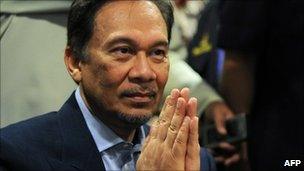Malaysian judge rules out DNA evidence against Anwar
- Published

Mr Anwar told reporters he was pleased with the judge's ruling in his favour
The judge hearing sodomy charges against the Malaysian opposition leader Anwar Ibrahim, has rejected key prosecution evidence.
Judge Zabidin Mohamed Diah said DNA taken from items used by Mr Anwar in a police cell had been wrongly obtained.
His decision grants the former deputy prime minister a rare victory in the lengthy trial.
Mr Anwar and rights groups say the trial - the second on the same charges - is a political conspiracy.
"I find that in this case the DNA samples from the three items... were obtained by unfair means from the accused," said Judge Zabidin Mohamed Diah.
The items - a toothbrush, water bottle and hand towel - were taken from the cell used by Mr Anwar following his arrest in 2008, and he had not been informed of their possible use against him.
The prosecution had argued the DNA from the items would link him to semen found on his accuser, his former aide Mohamad Saiful Bukhari Azlan.
Without this evidence, the prosecution must now rely largely on testimony by 25-year-old Mr Saiful who has claimed that Mr Anwar sodomised him in an appartment.
"I am grateful for the verdict and this just further supports what I have said, that I am being persecuted unfairly by the authorities in their bid to silence me," Mr Anwar told reporters.
Earlier in the trial, Mr Saiful was revealed as having an affair with the prosecution lawyer Farah Azlina Latif, but the judge ruled the relationship did not imperil the prosecution's case.
Human Rights Watch has said the charges should be dropped and that the case is a "charade of justice".
Mr Anwar was imprisoned on separate sex and corruption charges in 1998, and freed on appeal in 2004.
Sodomy is illegal in Malaysia, even among consenting adults.
Mr Anwar's opposition coalition made significant gains in the last election in 2008, removing the ruling coalition's long-held two-thirds parliamentary majority.
Prime Minister Najib Razak has led his allies to victory in a succession of by-elections since then and is thought to be considering whether to call early national elections.
- Published16 August 2010
- Published16 December 2010